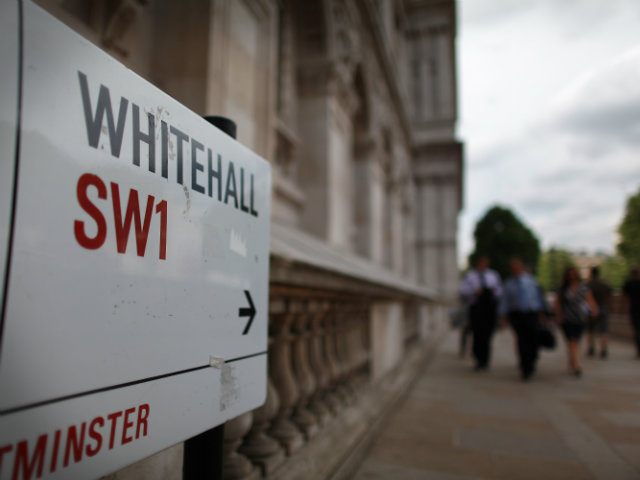Christianity is being “silenced” throughout the public sector thanks to a “secularising spirit” which permeates the culture and ensures Christians hide their faith, a former senior civil servant has said.
William Nye spent 20 years in Whitehall where he says Christianity is being “squeezed out,” but he believes that government ministers aren’t even aware of the situation.
The Prime Minister David Cameron used his recent Christmas message to affirm that Britain is still a Christian country, but apparently the civil service hasn’t got the memo.
Speaking to The Telegraph, Mr Nye, who held a number of senior Whitehall posts during his time as a civil servant, said that having a Christian faith is viewed within the public service as “odd or unusual” to an extent that would likely surprise government ministers and the general public alike.
“I think there has been, in the 20 years I was in the public sector, a sort of squeezing out of Christianity from many aspects of the public sector,” he said.
“[It is] not universal – obviously there are chaplains in hospitals, there are chaplains in prisons – and I don’t think it is minsters doing it deliberately.”
He admitted that a creeping secularisation of the public sector had led Christians to feel as though they could not disclose their faith, for fear of being seen biased.
“Of course, actually, in practice everybody, all my former colleagues in the civil service, all bring their own perspectives and their own personal beliefs to bear.
“They all, I genuinely believe, try to be neutral and objective but they all bring their beliefs to bear and so do Christians but Christians sort of feel [it is better] not to say about it.”
Mr Nye has now taken up a senior post within the Church of England, overseeing the day to day running of the church and helping to spear-head new initiatives to increase congregations. He admitted that it was a relief to finally be able to speak up about his faith in the workplace, saying: “It is now a joy for me to be in a place where, although having spent 20 years not talking about my faith … one can talk more openly about it.”
But when asked by the Church to recommend possible candidates for another senior position within the Church, one which requires the post holder to share the Church’s Christian aims, he admitted to not knowing which of his former colleagues had a Christian faith.
“I had to say ‘you know I’m not sure I would be able to think of many people because, why would I know about anyone in government who is a Christian unless they are a personal friend?’
“Personal friends might have revealed to me that they are Christians but other people in government, central government departments, wouldn’t do that.
“They wouldn’t let it be known that they were Christians.”
He added: “I think people who aren’t in the public sector don’t realise quite how that secularising spirit has led to the silencing of Christians in a way that isn’t actually, I think, what people nationally want, or people are necessarily aware of.
“There is a lot of support, I think, for the Church of England doing its job as the Queen said ‘gently and assuredly’ – for the quiet work of the Church of England.
“But quiet work shouldn’t mean silent.”
He agreed that there was an element of self-censorship among Christians within the public sector, saying: “Looking back on it I feel there may be an element of that and, I think, just a sense that it’s not really the ‘done thing’ to talk about religion in the 21st century, especially in government.
“You know: does it imply that you’ve somehow got some sort of axe to grind or it’s something odd and unusual?”
Two cases of Christians being hounded out of their public sector jobs have come to light in the last year: in November, a prison gardener who also volunteered as a chaplain was forced out of his paid role after he referred to 1 Corinthians 6:9-11 during a lesson on the importance of forgiveness to the Christian faith. Although the verses refer to “drunkards”, “slanderers” and “swindlers” as well as “men who have sex with men,” prison authorities deemed the excerpt to be in breach of equality laws. The Rev Barry Trayhorn is now suing the prison authorities for constructive dismissal.
And in October, a senior NHS occupational therapist who was branded a “religious nutcase” and accused of “harassing and bullying” a Muslim co-worker after offering to pray for her won the right to appeal against an employment tribunal decision which found that the Trust she worked for was right to suspend her for gross misconduct.
Victoria Wasteney accused the East London NHS Trust of failing to clear her of any wrongdoing because it would be “politically incorrect” to find a Christian innocent.
Wasteney later commented: “The NHS is increasingly dominated by a suffocating liberal agenda that chooses to bend over backwards to accommodate certain beliefs but punishes the Christian.”
She will now be taking her case to the Employment Appeal Tribunal, citing the European Convention on Human Rights’ protection of freedom of religion and expression.

COMMENTS
Please let us know if you're having issues with commenting.